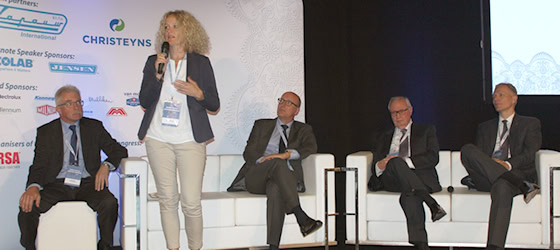WTSC Panel Touts Innovation, Teamwork

WTSC Global Trends panelists include (l/r):Charles Betteridge, Christeyns; Willemijn Martens, Accor Hotels, Benelux; Jesper Jensen, Jensen Group; Martin Kannegiesser, Herbert Kannegiesser GmbH; and Sam De Boo, Ecolab Europe.
The opening panel at the World Textile Services Congress (WTSC) in Bruges, Belgium, provided the roughly 200 attendees gathered in the historic Belfry and Market Halls with both macro and micro analyses of trends affecting textile services operators worldwide.
Key themes included a focus on the need for industries (such as textile services) and governments across the developed world to preserve the economic gains of globalization by embracing innovation and improving productivity and teamwork.
Without advancements in these respects, populist parties in countries such as the U.S. and Germany could dramatically increase their influence, said panelist Martin Kannegiesser, president of Herbert Kannegiesser GmbH, Vlotho, Germany, leading to trade restrictions and other regulatory actions that would hurt businesses.
Harking back to a similar period in the 1990s, Kannegiesser said Germany once again is debating whether to embrace more economic liberalization or a more regulated economy. “We largely went in the direction of more liberalization,” he said of the situation in the ’90s. “But with today’s problems globalization is in jeopardy.”
Kannegiesser said the business community should help lead collaborative efforts to spur growth. He cited examples such as the “ripcord” system that prompts German BMW plant workers to alert managers immediately when they see a problem that could reduce productivity or quality. “They want to make sure that immediately everybody that has anything to do with this can deal with the problems, can see it through the eyes of the people on the shop floor,” Kannegiesser said.
He also called for greater investments in improved productivity to spur growth, a move in which governments can play a positive role. “To create big advances in productivity means that we need the political framework for this,” Kannegiesser said. “If politics and tax policies are a burden blocking the capability of our investment, that is bad.”
Several speakers, including Willemijn Martens, procurement director for Accor Hotels in the Benelux region (Belgium, the Netherlands and Luxembourg), addressed the need for enhanced collaboration in varying contexts.
Hotels in Western Europe have long relied on outsourced laundry services for linens, she said. However, some are considering in-sourcing these services due to quality-control issues. Specifically, Martens cited concerns about a lack of reporting on how many washes hotel sheets have received. In such cases, hoteliers worry that their linens aren’t meeting guest expectations. To avoid a trend toward insourcing of hotel laundering, outsource laundries need to manage the process more thoroughly, she said.
“If you don’t want this phenomenon of purchasing linen vs. rental, please do something about this because we (hoteliers) do not feel comfortable with the fact that we cannot fully monitor the age and number of washes of the linen. That’s an important message that we’re trying to give today.”
The next speaker, Charles Betteridge, VP, Christeyns, Offenburg, Germany, urged launderers to invest in technology that documents costs as well as productivity. Such capability is essential to boost profitability, quality and service and avoid competing on price alone. “If you don’t know what your costs are, you can’t be efficient,” Betteridge said. “We’ve all got to be more efficient. And to survive, everyone has to know that.”
Survival’s great, but to achieve growth and take advantage of opportunities in a global economy, companies also must innovate, said Jesper Jensen, CEO, JENSEN Group, Switzerland. He cited the Apple iPhone and Tesla’s electronic car as examples of creative thinking that led to groundbreaking successes. “If you want to prevail in this world of globalization, the only way to make a difference is innovation,” he said. Avoiding commoditization requires developing new products or services that customers haven’t yet imagined. “In order to reach innovation I think we have to look beyond needs,” Jensen said. “Not just what the customer needs today.”
Speaking of innovation in the laundry sphere, Jensen said the industry has made great strides in recent years toward improving efficiency and service. “If you look 20 years back to where the laundry industry was and where the laundry industry is today, for a rather small industry, we’ve done huge steps in automation, in the way you service your customers. In the whole way we are dealing from a factory point of view with total solutions.”
While everyone welcomes progress, employee safety also must be a prominent part of this process of continuous improvement and innovation, said Sam De Boo, VP and general manager of Ecolab Europe. His presentation shifted the momentum back to a discussion of micro-level issues affecting individual companies as well as the industry as a whole.
Unfortunately, a chemical incident involving an Ecolab employee caused the company to rethink its focus on safety, he said. Since then, Ecolab Europe has made great strides, but it’s still fine-tuning its program. “We started on this journey, and I’m happy to say a couple of years later we are much further down to the right,” he said. “We are not at the full interdependent state where you want to be, where you say, ‘I look for my own safety but I also look for my colleagues’ safety.’ We are getting there and I am very positive about it.”
The WTSC took place Oct. 5-7, featuring this discussion and two others with textile services industry panelists as well as keynote presentations highlighting economic, political and regulatory issues that drive the industry’s profitability. Participants also visited nearby laundries and enjoyed social events and tours of local tourist spots. Several European national textile services associations, as well as TRSA and the European Textile Services Association, conducted Board of Directors meetings at the WTSC.
